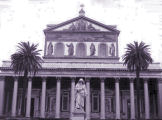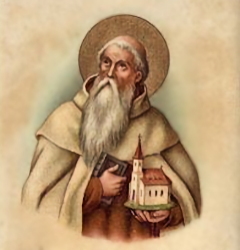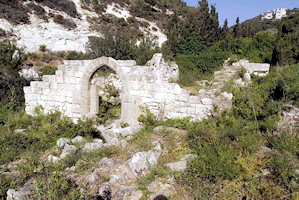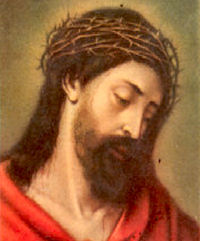Lent: March 29th
Wednesday of the Fourth Week of Lent
Other Commemorations: Bl. Berthold of Mount Carmel (RM) ; Other Titles: Berthold of Calabria
» Enjoy our Liturgical Seasons series of e-books!
"Do not be amazed at this, because the hour is coming in which all who are in the tombs will hear his voice and will come out, those who have done good deeds to the resurrection of life, but those who have done wicked deeds to the resurrection of condemnation (Jn. 5:28-29)."
This day was called the 'Feria of the great scrutiny,' because in the Church of Rome, after the necessary inquiries and examinations, the list of the catechumens, who were to receive Baptism, was closed. The Station is held in the basilica of St. Paul outside the walls, both because of the size of the building, and also in order to honor the apostle of the Gentiles by offering him these new recruits, which the Church was about to make from paganism. The reader will be interested and edified by a description of this ceremony.
| The Station today is at St. Paul without-the-walls. On this day the catechumens were subjected to a new examination and, if approved, were registered for Baptism. The beginning of the four Gospels was read to them, and the Creed and the Our Father was "given," or explained to them. Today's Mass has a decided Baptismal character. The joys of this day were anticipated on Laetare Sunday. |  |
Meditation - Submission and Christian Obedience
Continual submission to the holy will of God is the most universal of all virtues and its practice should be most familiar to you, since at every moment there arise opportunities of renouncing your own will and submitting to the will of God. His will is always easy to recognize. God has willed that all things that are extremely necessary should also be very easy to obtain. The sun, for instance, and air and water, and the other elements are most necessary for man's natural life; so, also, these things are common and freely available to everyone.
In the same way, since God has placed you in this world only to do His holy will, and your salvation depends upon this, it is, therefore, extremely necessary that you should easily know God's will in all that must be done. So, He has made it easily recognizable, manifesting His holy will in five chief ways which are very certain and evident:
- by His commandments;
- by His counsels;
- by the laws, rules and obligations of our state in life;
- by the authority of those placed over you or directing you;
- by events, since every happening in an infallible sign that God so wills, either by absolute or by permissive will.
Excerpted from The Life and Kingdom of Jesus in Christian Souls, St. John Eudes
Bl. Berthold of Mt. Carmel
 Blessed Berthold seems to have had a connection with the beginnings of the Carmelite Order. He was a relative of Aymeric, the Latin patriarch of Antioch who was installed in Antioch during the crusades. At the time, there were a number of hermits from the West scattered throughout Palestine, and Berthold gathered them together, founded a community of priests who settled on Mount Carmel, and became their first superior.
Blessed Berthold seems to have had a connection with the beginnings of the Carmelite Order. He was a relative of Aymeric, the Latin patriarch of Antioch who was installed in Antioch during the crusades. At the time, there were a number of hermits from the West scattered throughout Palestine, and Berthold gathered them together, founded a community of priests who settled on Mount Carmel, and became their first superior.
There is a legend that he was born at Limoges in France, studied in Paris, and was ordained a priest there. According to the legend, he accompanied Aymeric on the crusades and found himself in Antioch when it was being besieged by the Saracens. Through his urgings, the Christians in Antioch turned to prayer and penance, and the city was delivered.
What is known for certain is that Bl. Berthold directed the building of a monastery and church on Mount Carmel and dedicated the church in honor of the prophet Elias, who had defeated the priests of Baal there and seen the vision of the cloud out over the sea. This is confirmed in a letter of Peter Emilianus to King Edward I of England in 1282.
 Berthold lived out his days on Mount Carmel, ruling the community he had founded for forty-five years until his death about 1195. His example and way of life stamped the beginnings of the Carmelite Order, leading to the drawing up of the order’s rule by St. Albert, Latin patriarch of Jerusalem, about 1210. That rule was approved by Pope Honorius III in 1226 and it is this primitive rule that is considered the foundation of the Order of Mount Carmel.
Berthold lived out his days on Mount Carmel, ruling the community he had founded for forty-five years until his death about 1195. His example and way of life stamped the beginnings of the Carmelite Order, leading to the drawing up of the order’s rule by St. Albert, Latin patriarch of Jerusalem, about 1210. That rule was approved by Pope Honorius III in 1226 and it is this primitive rule that is considered the foundation of the Order of Mount Carmel.
But it seems to have been Berthold who first organized the monastic life of the hermits on Mount Carmel and governed them until his death. St. Brocard, who apparently was his successor, petitioned Albert to compose a rule for them, undoubtedly codifying and completing the work begun by Berthold.
—Taken from ucatholic.com
Highlights and Things to Do:
- Read more about Bl. Berthold:
- Read more about about the Order of Carmel: On the History and Spirit of Carmel.






